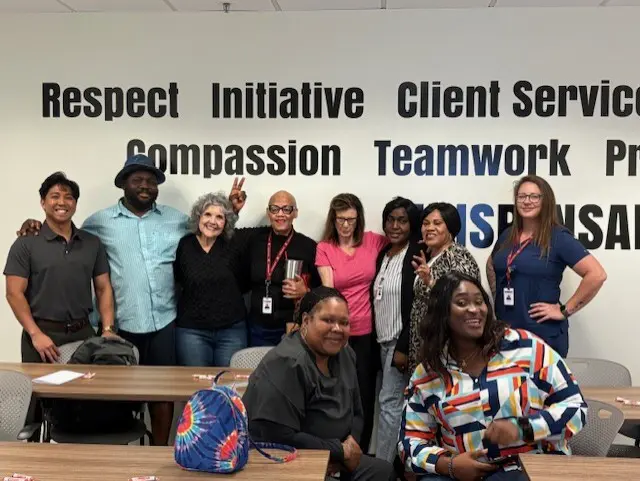Walking into Their World: The Importance of Validation Therapy in Dementia Care
At Cambridge Caregivers, we constantly strive to enhance the care we provide to clients living with dementia. Recently, our caregiving team gathered for a powerful training session led by Lilly Adrian, owner of The Bridge of Time.
Lilly, a memory care programming consultant and trainer, shared insights about validation therapy from her decades of experience in dementia care and education.
Validation therapy is a technique that emphasizes accepting and validating the feelings and experiences of individuals with dementia, even when those feelings or beliefs do not align with reality. This approach focuses on entering the client’s world rather than trying to force them into ours. Validation therapy can reduce agitation, improve communication and enhance a person’s sense of dignity and well-being.
“Validation therapy can make the journey just a little bit easier for people living with dementia,” Lilly told the group.
“Now I was raised by a Baptist pastor. I was taught that you don’t lie. Then my dad was diagnosed with Alzheimer’s. I started doing exactly what I was told I couldn’t do. The term I use is ‘therapeutic fibbing.’ I learned it wasn’t the truth according to me that mattered. It was the truth according to my dad that I had to validate.”
Validation therapy stands in contrast to reality therapy, which tries to orient people with dementia back to objective facts. Lilly shared a personal example.
“My dad lived on a hundred acres of land, where he was born and raised,” Lilly said. “Every time I visited, he would say, ‘When I was a little boy, I used to ride white horses all over this land.’ My mother would immediately say, ‘Fred, you’ve never ridden a horse a day in your life.’ She was convinced that by correcting him she could get him back to normal.”
Lilly’s mother eventually learned the importance of walking into the world of the person living with dementia. “Doing that is easier for you and easier for them,” Lilly said. “Because what they feel and what they say is real to them, even though it’s not real to us.”
She illustrated this with a simple analogy. “If my 4-year-old grandson is afraid that a dinosaur is going to climb into his bedroom window at night, I’m not going to be able to convince him otherwise,” Lilly said. “So what do I need to do instead? Turn the lights on, maybe lay down next to him or sing to him until he goes to sleep. I walk into his world and help him.”
Lilly shared a story about Miss Doris, a resident she worked with in assisted living. “Miss Doris was confused, trying to leave the facility and becoming hysterical. She said, ‘I’ve got to get this medication to my mother.’ She was sure her mother would die without it.”
Instead of confronting her with reality, Lilly asked to see the medication. Miss Doris handed her an empty bottle.
“I said, ‘Oh, I took this up to the hospital last night. All is well. They’ve already started your mother on that medication. Thank you.’” Miss Doris immediately calmed down.
Caregivers at the training shared their own experiences working with clients with dementia and discussed tips for handling situations with compassion, humor and patience. They practiced remaining attentive, maintaining eye contact and listening deeply to validate clients’ emotions.
“Before we can validate the ones we’re working with, we must learn how to listen to them,” Lilly reminded them.
At Cambridge Caregivers, we believe ongoing training is one important way we support our caregivers and equip them to provide concierge-level care. Our caregivers must serve as the calm in the storm – a confident, calm presence for each client and their family. Validation therapy is just one more tool to help us do that with grace and dignity, walking alongside our clients and making their world feel safer and more peaceful.


